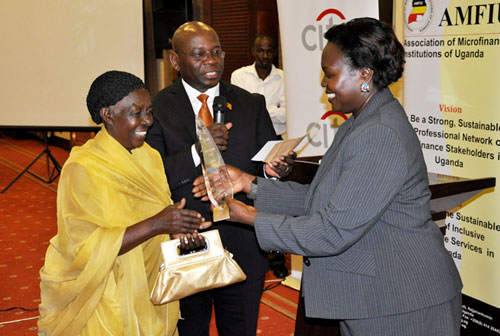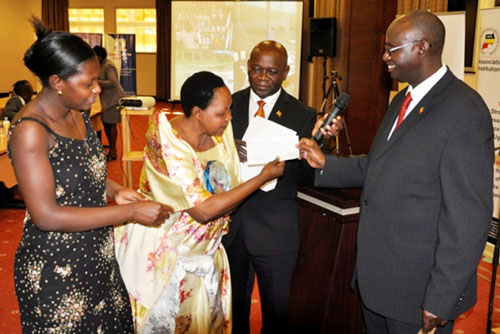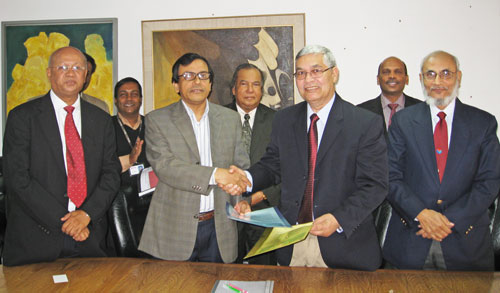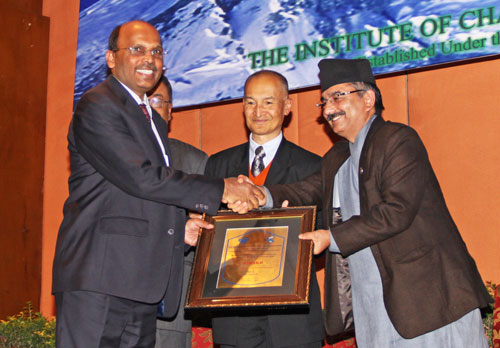
National seminar on the role of livestock in reducing extreme poverty
26 December 2010, Dhaka. Concentrating on the provision of social protection and social reintegration of the ultra poor, BRAC Advocacy Unit is striding to create massive responsiveness in favour of the ultra poor whose lives are dominated by extreme poverty and hunger. Realising the role of livestock in reducing ultra poverty and bringing about other positive changes, BRAC Advocacy Unit organised a national seminar on “The Role of Livestock in Reducing Ultra Poverty in Bangladesh” on 22nd December at the Banquet Hall of Hotel Abakash of Bangladesh Parjatan Corporation at Mohakhali, Dhaka.
The main objectives behind organising this seminar were:
- Enhancing implementation of existing pro poor policies and related services in favour of ultra poor
- Identification of future policy areas for reducing ultra poverty in Bangladesh
Md. Abdul Latif Biswas, the Honourable Minister, Ministry of Fisheries and Livestock Services (MoF & LS), Government of the People’s Republic of Bangladesh was the chief guest of the seminar whereas Ujjwal Bikash Dutta, Honourable Secretary of MoF & LS inaugurated the seminar. Md. Ashraf Ali, Director General, Department of Livestock Services (DLS) and Shykh Seraj, renowned media personality and Director and Head of News, Channel- i graced the seminar as special guests. Sheepa Hafiza, Director, Gender Justice & Diversity and Advocacy, BRAC was the moderator.
Professor Md. Hafezur Rahman PhD from Bangladesh Agricultural University presented the keynote paper. Along with the directors of the DLS, Divisional Deputy Directors and District Livestock Officers, renowned journalists, educationists, researchers, representatives from development partners, and different INGOs also participated in the seminar.
With active participation from the discussants, chief guest, special guests and audience, some very valuable recommendations and guidelines arouse which will help to mobilise Government’s livestock services towards removing ultra poverty in Bangladesh. At the same time The Ministry of Fisheries and Livestock Services also committed to extend its existing services like vaccination, livestock treatment and medicines to the doorsteps of the ultra poor.
BRAC Uganda Microfinance Limited borrowers win enterpreneurship awards
24 December 2010, Dhaka. Two female micro-entrepreneurs supported by BRAC Uganda Microfinance Limited, Theresa Twinomugisha and Ruth Naigaga Wamulo emerged winners of gold and bronze awards respectively in the Citi Microentrepreneurship Awards 2010.
The competition was organised by the Citigroup Foundation in collaboration with the Association of Microfinance Institutions of Uganda (AMFIU) to recognise the extraordinary contributions that individual micro-entrepreneurs have made to the economic stability of their families and their communities in Uganda. It drew over 100 entrepreneurs supported with loans from Microfinance Institutions (MFI), Microfinance Deposit-taking Institutions (MDI) and Savings & Credit Cooperative Organizations (SACCOs) in Uganda. BRAC Uganda was the only MFI whose candidates won a gold and bronze award and was awarded a certificate of recognition. Other awards went to SACCO members.
 Twinomugisha receiving the Gold award from Hon. Minister of Microfinance
Twinomugisha receiving the Gold award from Hon. Minister of Microfinance
Twinomugisha was rewarded with UGX 10 million while Wamulo was among the top 13 entrepreneurs who won bronze plaques plus UGX 1.5 million. Other 14 winners received certificates of recognition plus UGX 400,000. Ruth receiving the cheque of UGX 1.5m
Ruth receiving the cheque of UGX 1.5m
Winners were drawn by a nine-member panel of microfinance experts chaired by the Managing Director of CitiBank. The awards ceremony was held on Wednesday, December 15, 2010 in Kampala’s Serena hotel and was presided over by State Minister for Microfinance, Hon. Ruth Nankabirwa.
The Country Representative of BRAC Uganda, Mr Khondoker Ariful Islam was also present together with the Microfinance Programme Manager, Mr Rafiqul Islam, the credit officers; Evelyne Nasaka and Juliana Negaga, who have been serving Twinomugisha and Wamulo.
In short speeches after receiving the awards, Twinomugisha and Wamulo thanked BRAC Uganda for the support rendered to them in their enterprises and urged all other entrepreneurs, especially women, to work harder.
BRAC Uganda Microfinance Limited borrowers win enterpreneurship awards
24 December 2010, Dhaka. Two female micro-entrepreneurs supported by BRAC Uganda Microfinance Limited, Theresa Twinomugisha and Ruth Naigaga Wamulo emerged winners of gold and bronze awards respectively in the Citi Microentrepreneurship Awards 2010.
The competition was organised by the Citigroup Foundation in collaboration with the Association of Microfinance Institutions of Uganda (AMFIU) to recognise the extraordinary contributions that individual micro-entrepreneurs have made to the economic stability of their families and their communities in Uganda. It drew over 100 entrepreneurs supported with loans from Microfinance Institutions (MFI), Microfinance Deposit-taking Institutions (MDI) and Savings & Credit Cooperative Organizations (SACCOs) in Uganda. BRAC Uganda was the only MFI whose candidates won a gold and bronze award and was awarded a certificate of recognition. Other awards went to SACCO members.
 Twinomugisha receiving the Gold award from Hon. Minister of Microfinance
Twinomugisha receiving the Gold award from Hon. Minister of Microfinance
Twinomugisha was rewarded with UGX 10 million while Wamulo was among the top 13 entrepreneurs who won bronze plaques plus UGX 1.5 million. Other 14 winners received certificates of recognition plus UGX 400,000. Ruth receiving the cheque of UGX 1.5m
Ruth receiving the cheque of UGX 1.5m
Winners were drawn by a nine-member panel of microfinance experts chaired by the Managing Director of CitiBank. The awards ceremony was held on Wednesday, December 15, 2010 in Kampala’s Serena hotel and was presided over by State Minister for Microfinance, Hon. Ruth Nankabirwa.
The Country Representative of BRAC Uganda, Mr Khondoker Ariful Islam was also present together with the Microfinance Programme Manager, Mr Rafiqul Islam, the credit officers; Evelyne Nasaka and Juliana Negaga, who have been serving Twinomugisha and Wamulo.
In short speeches after receiving the awards, Twinomugisha and Wamulo thanked BRAC Uganda for the support rendered to them in their enterprises and urged all other entrepreneurs, especially women, to work harder.
BRAC Pakistan wins "Humanitarian Excellence Award"
22 December 2010, Dhaka. BRAC Pakistan has been awarded with "Humanitarian Excellence Award" by RAKz Communication (PVT) Limited, Pakistan, for its contributions and accomplishments, for the relief and rehabilitation of the flood victims of Pakistan this year.
With the heavy rainfalls and the ensuing flood in Pakistan effecting 3 million people, BRAC temporarily halted its microfinance and health operations in Khyber-Pakhtunkhwa and focused on providing emergency relief. Drawing upon years of experience in flood relief work in Bangladesh, BRAC Pakistan staff responded rapidly and effectively in assisting the people of Khyber-Pakhtunkhwa province.
The 12 branch offices of BRAC distributed relief packages consisting of vital food rations & oral rehydration solution packets (ORS). A mobile medical team provided treatment for various diseases like fever, diarrhoea and dehydration. BRAC Pakistan`s 25 Health Workers and Health Volunteers were among the medical team to reach remote areas and ensure proper coverage, providing medicines and ORS.
BRAC receives trust fund for Medhabikash

22 December 2010, Dhaka. Dr. Taufiq Ahmed, a Bangladeshi born Australian resident and Dr. Shafiqul Islam, Director, BRAC Education Programme signed an agreement at BRAC Centre today. Dr. Taufiq has set up a trust in memory of his parents, Mr. Abdul Malik and Mrs. Khodeja Ahmed. The money from this trust will be used to give scholarships to meritorious students who are poor and studying in H.S.C and Honours level. Medhabikash, which is a component of the BRAC Education Programme, will give out the scholarships to deserving students. Mr. Abdul Muyeed Chowdhury, Chairman bracNet, Dr. Mahbub Hossain, Executive Director, BRAC and S.N Kairy, Director, Finance and Accounts, BRAC were also present.
Students get firsthand experience on ultra poor scenario of Bangladesh
21 December 2010, Dhaka. BRAC Advocacy Unit seeks to mobilise youth groups in favour of the Ultra Poor. The Advocacy Unit regularly organises quizzes, seminars and debates from the grassroots to the national level with a view to informing the students about the poverty situation and the ultra poverty scenario of Bangladesh and to sensitise them to take constructive initiatives for poverty reduction As a follow up of ‘Intra School Debate Competition 2010’, Advocacy Unit organised a three-day long youth field visit from 13 to 15 December 2010 in Rajshahi district at Poba and Tanor upazila. Six students and two teachers from Udayan High School and Wills Little Flower School & College participated in the field visit to experience the real poverty situation of Bangladesh. During these three days they observed different BRAC activities like Popular Theater, Pre-primary School, Union Workshop, Community Initiative-Van Distribution, Selection Process of the STUP (Specially Targeted Ultra Poor) Members, Health Support, (Human Rights and Legal Aid Services)HRLS Support and Gram Daridro Bimochon Committee (GDBC) meeting. The students would submit a report on their field visit. We strongly believe such involvement in a national agenda like Ultra Poverty will engage the students as ambassador of social change both at family and community level.
BRAC Advocacy Unit participates in International Migrants’ Day campaigns
20 December 2010, Dhaka. On the eve of the International Migrants’ Day 2010 BRAC Advocacy Unit’s Safe Migration Facilitation Centre (SMFC) organised a two-day long “Migration and Development Fair” jointly with Government, at Rangpur from 18-19 December, by bringing together all the stakeholders, Government officials, NGO, Civil Society Recruiting Agency and Student Counselors under one umbrella of safe migration.
The main objectives behind organising such a unique fair were,
I) to promote safe migration in the northern part of Bangladesh (Monga Area) as an alternative to poverty alleviation;
II) to make the mass aware about safe migration decision making process; and
III) to motivate stakeholders for decentralising safe migration services to the doorstep of migrant workers.
Mr. Mia Abdullah Mamun, Additional Divisional Commissioner, Rangpur inaugurated the event where as Mr. B. M. Enamul Haque, Deputy Commissioner, Rangpur chaired the inaugural programme accordingly. A press conference was held on 17 December at Rangpur Press Club Auditorium. In line with that SMFC had activities in 21 Districts and 36 Upazillas around the country. The activities included rallies, discussion sessions and cultural programmes and exclusive media coverage on migration promotion on ATN News.
Alongside SMFC also participated in the daylong awareness raising campaign with the Government at the Osmani Memorial Auditorium, Dhaka and took part in the fair held in the premises. Sheikh Hasina, Honourable Prime Minister of Bangladesh inaugurated the event. A talk show and a special supplement were also published in the national dailies upholding the day.
Space technology can help BRAC
19 December 2010, Dhaka. An article titled “Deltas in Space: The Space Technology Comes Down to Earth” by Michael Van Der Mark came out in the Dutch Magazine called ‘Deltas in Times of Climate Change’. The article talks about space technology and water management technology and how cooperation between the two sectors can result in many benefits. Space technology predictions can help predict weather and its benefits can even reach everyday farmers with water availability forecasts. The article says organisations such as BRAC can reap benefits from space technology by better understanding variations of weather through reliable and advanced predictions will mean less loss of lives and crops. The following are a few extracts from the article:
One of the organizations that could benefit from the developments is BRAC, a large organization working to alleviate poverty in Bangladesh and nine other countries in South Asia, Africa and Haiti. Based in Dhaka, Bangladesh, BRAC not only provides access to financial services but also to health, education, water and sanitation services. Dr Babar Kabir, BRAC’s Director for Water and for Disaster, Environment and Climate Change, explains that major challenges remain: “We need to ensure food security and reduce vulnerability to natural disasters. It is here that science (from satellite data downwards) can play a significant role, by providing early warnings and help us to better understand weather variability resulting from climate change.” Optimizing the hydrological data supply chain is important, says Dr Kabir, as it would link science to grassroots development: “Researchers have limited themselves to linking to academic institutions. They have ignored the strength of the NGOs and others who work for the development of the common people.” BRAC’s work focuses on the poor, especially women and children, and better understanding of variations in the weather through reliable and advanced predictions will mean less loss of lives and crops.
In the end it will be organizations like BRAC that will be able to issue better seasonal forecasts for local rice farmers, so that the premium on crop insurance can be reduced from four to three percent – a net gain of 25 percent!” Dr Kabir agrees. “Yes, definitely. Farmers, fishermen, small-scale private entrepreneurs – all will benefit. Given that the initial focus will be on weather forecasting and event predictions, the reliability of the data will be critical, whether it is to understand that a disaster is approaching or to provide very specific rainfall prediction. Tracking of the monsoon landfall is very important for agricultural activities in Bangladesh, as many crops are rain fed. Accurate rainfall prediction, when and how much, will help farmers to increase productivity. Once disaster prediction has been perfected, farmers can then be encouraged to engage in crop insurance.” Reliable data will mean that BRAC would be able to save on insurance premiums, enabling them to purchase data from the streamlined process. Nevertheless, Dr Kabir adds, “While BRAC is trying to develop its own expertise to understand the scientific data, it does not wish to duplicate efforts or expertise that already exists elsewhere. We need to find an easy way of coordinating both between and within the scientific community. We need data analysis based on client needs, and reports that are in non-scientific language.”
To read the full article please download :
http://www.changemagazine.nl/doc/deltatimes/deltas-in-space.pdf
BRAC wins award for Transparent Financial Reporting
12 December 2010, Kathmandu. BRAC was awarded the South Asian Federation of Accountants (SAFA) 2009 award in the category of Non Governmental Organisations for the Best Presented Accounts and Corporate Governance Disclosures.

Mr. S.N. Kairy, Director Finance & Accounts, received the award on behalf of BRAC at a ceremony held on Sunday, December 12, 2010 at the Hotel Soaltee Crowne Plaza in Kathmandu, Nepal. Mr. Surendra Pandey, Honourable Minister for Finance, Government of Nepal was the chief guest of the event. BRAC previously received the SAFA Award for the years 2005, 2006, 2007 and 2008.
SAFA is a forum of professional accountancy bodies committed to developing the accountancy profession in the South Asian region. The Best Presented Accounts awards are conferred on the basis of evaluation administered by SAFA's Committee for improvement in transparency, accountability and governance of published annual reports of entities from South Asian countries.
BRAC Hosts Seminar on “Public Private Participation in Safe Migration Management”
12 December 2010, Dhaka. With a vow to instigate public private participation in Safe Migration Management as well as creating a good rapport with recruiting agencies for pro-migration services, BRAC Advocacy Unit’s Safe Migration Facilitation Centre (SMFC) and The National Alliance of Migrant’s Rights, Bangladesh (NAMR’B) jointly organised a seminar on “Public Private Participation in Safe Migration Management” with the support of Manusher Jonno Foundation (MJF) at the Auditorium of BRAC Centre today. Currently SMFC is acting as the secretariat of NAMR'B on national level lobbying, advocating and creating pressure for pro-migrant issues. To keep NAMR’B moving ahead with national migration issues was another agenda for organising this seminar which was divided into three sessions with different key presenters, chairs and panel discussants.
The first session was represented by the civil society, the second by the recruiting agencies and the final session was facilitated by the representatives from Bangladesh Government. SK. Mojibul Huq, Manager, BRAC Advocacy Unit was the moderator of the seminar.
Dr. Uttam Kumar Das, Deputy Director of South Asian Institute of Advanced Legal and Human Rights Studies (SAILS) presented the keynote paper of the first session titled “Safe Migration and Bangladesh: Potentials, Possibilities and Problems”. The keynote paper of the second session was prepared by Mr. Ali Haider Chowdhuri, Secratery General, Bangladesh Association of International Recruiting Agency (BAIRA) and was presented by Radyan Rahave from BRAC Advocacy Unit titled “Migration & Economic Development: Declaration as Thrust Sector in Bangladesh”. In the final session, Mr. Kafayet Ullah, Deputy Secretary to Bangladesh Government presented the key note titled “Managing Safe Migration: Public Private Cooperation”.
All the three sessions were followed by open floor discussions where all the participants expressed their thoughts and views on the respective topics. From their argument some very valid and important recommendations came out which would contribute to facilitate very effective and efficient public private participation in Safe Migration Management.
Mr. Anisul Islam Mahmud, Honourable Member of Parliament and Chair to Parliamentary Standing Committee of Ministry of Expatriate Welfare and Overseas Employment, was present as the Chief Guest in the seminar. Dr. Jafar Ahmed Khan, Honourable Secretary to Ministry of Expatriate Welfare and Overseas Employment (MEWOE) inaugurated the seminar. Dr. Mahabub Hossain, Executive Director of BRAC welcomed all the participants from the Government, recruiting agencies and NGOs in the seminar.
Join the world’s biggest family




